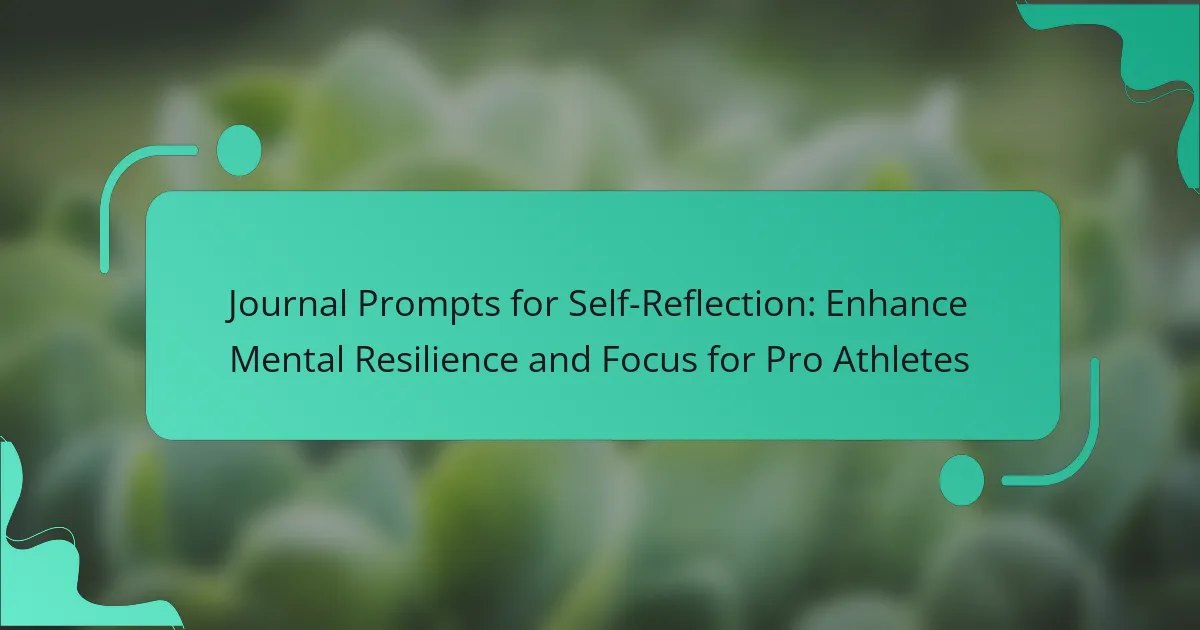Pro athletes often face immense pressure, making mental resilience and focus crucial for success. Journal prompts for self-reflection enhance self-awareness, helping athletes evaluate their goals and challenges. These prompts foster emotional processing, clarify intentions, and promote accountability. Establishing a consistent journaling routine in a supportive environment can significantly boost performance and personal growth.

What are Journal Prompts for Self-Reflection?
Journal prompts for self-reflection help pro athletes enhance mental resilience and focus. These prompts encourage introspection, allowing athletes to evaluate their thoughts, feelings, and performance. Effective prompts include questions about personal goals, challenges faced, and lessons learned from experiences. Regularly engaging with these prompts fosters self-awareness, leading to improved mental clarity and emotional stability. This practice can significantly boost an athlete’s performance by cultivating a strong mindset.
How do journal prompts enhance self-talk for pro athletes?
Journal prompts significantly enhance self-talk for pro athletes by promoting self-awareness and mental clarity. These prompts encourage athletes to reflect on their thoughts, emotions, and experiences, fostering a positive internal dialogue. Regular journaling can lead to improved focus and resilience, essential for high-performance environments. Research indicates that athletes who engage in self-reflective writing report better emotional regulation and mental toughness. By integrating specific prompts, such as gratitude or goal-setting questions, athletes can cultivate a mindset that supports their training and competition.
What role does inner dialogue play in athletic performance?
Inner dialogue significantly enhances athletic performance by fostering mental resilience and focus. Pro athletes can leverage self-reflection through journal prompts to clarify goals and manage stress. This practice develops a unique attribute: heightened self-awareness, which allows athletes to identify and overcome mental barriers. Regular engagement with inner dialogue facilitates a positive mindset, improving concentration during high-pressure situations. Consequently, athletes can optimize their performance and achieve peak results.

What are the universal benefits of self-reflection for athletes?
Self-reflection offers athletes enhanced mental resilience and focus. It fosters self-awareness, enabling them to identify strengths and weaknesses. Regular practice of self-reflection can lead to improved performance metrics, as athletes learn to manage stress and develop coping strategies. Additionally, it promotes goal-setting and accountability, which are crucial for long-term success in competitive sports. Engaging with journal prompts can deepen these benefits by providing structured avenues for exploration and insight.
How does self-reflection improve mental resilience?
Self-reflection enhances mental resilience by promoting self-awareness and emotional regulation. Regular journaling helps pro athletes identify stressors and develop coping strategies. This practice can lead to improved focus, enabling athletes to perform under pressure. Studies show that self-reflection increases adaptive coping mechanisms, which are crucial for overcoming challenges in competitive environments.
What impact does self-reflection have on focus and concentration?
Self-reflection significantly enhances focus and concentration by fostering mental clarity and emotional regulation. Engaging in self-reflection allows pro athletes to identify distractions and develop strategies to maintain focus. Studies indicate that regular reflection can improve cognitive performance, leading to better concentration during training and competition. This practice cultivates resilience, enabling athletes to navigate challenges effectively and stay mentally present.

What unique attributes do effective journal prompts possess?
Effective journal prompts possess unique attributes that foster deep self-exploration and mental clarity. These prompts encourage specific reflection, guiding pro athletes to identify personal challenges and strengths. They often incorporate open-ended questions that stimulate critical thinking and emotional processing. Additionally, they are designed to be adaptable, allowing athletes to tailor responses based on their current experiences and goals. This adaptability enhances their relevance and effectiveness in promoting mental resilience and focus.
How can prompts be tailored for specific sports or disciplines?
Tailoring prompts for specific sports or disciplines enhances mental resilience and focus for pro athletes. Custom prompts can reflect the unique challenges and goals of each sport, fostering deeper self-reflection.
For example, a basketball player might use prompts that address teamwork and strategy, while a swimmer could focus on personal endurance and technique. This specificity allows athletes to engage with their mental processes in a relevant context, improving performance.
Incorporating unique attributes of each sport, such as competition frequency and psychological demands, can further refine these prompts. This personalization ensures that athletes can relate their self-reflection to their specific experiences, cultivating a stronger mental game.
Ultimately, tailored prompts serve as powerful tools for athletes, enhancing their ability to navigate both training and competition effectively.
What are the most effective formats for journal prompts?
The most effective formats for journal prompts include open-ended questions, structured templates, and visual prompts. Open-ended questions encourage deep self-reflection, while structured templates provide guidance for specific areas of focus. Visual prompts, such as images or quotes, can inspire creativity and emotional responses. Each format enhances mental resilience and focus for pro athletes by fostering engagement and introspection.

What rare insights can be gained through reflective journaling?
Reflective journaling offers rare insights into self-awareness and emotional processing. It enhances mental resilience by allowing pro athletes to identify patterns in their thoughts and behaviors. This practice can reveal underlying fears, motivations, and stressors that impact performance. Additionally, it fosters focus by clarifying goals and intentions, enabling athletes to align their actions with their aspirations. Regular reflection transforms experiences into valuable lessons, promoting personal growth and mental fortitude.
How can athletes uncover subconscious beliefs through journaling?
Athletes can uncover subconscious beliefs through journaling by using targeted prompts that provoke self-reflection. These prompts encourage exploration of thoughts, emotions, and experiences, revealing underlying beliefs that may influence performance.
For example, prompts like “What fears do I have about competing?” or “What past experiences shape my current mindset?” can lead to insights. Regular journaling fosters a habit of introspection, enhancing mental resilience and focus.
Research shows that athletes who engage in reflective journaling report improved clarity and confidence. This practice not only identifies limiting beliefs but also reinforces positive affirmations, contributing to overall mental strength.
Incorporating journaling into daily routines can transform an athlete’s mindset, allowing them to confront and reshape subconscious beliefs effectively.
What uncommon themes should athletes explore in their reflections?
Athletes should explore themes like vulnerability, identity beyond sport, and the impact of failure in their reflections. These uncommon themes foster deeper self-awareness and resilience. Examining vulnerability can reveal strengths in overcoming challenges. Reflecting on identity beyond sport encourages a holistic view of self. Analyzing failure provides insights into growth and grit, essential for mental resilience.

What are the best practices for implementing journal prompts?
To effectively implement journal prompts, establish a consistent routine, tailor prompts to specific goals, and create a supportive environment. Consistency enhances mental resilience, while personalized prompts encourage deeper self-reflection. A quiet, distraction-free space fosters focus and creativity. Using a variety of prompt types, such as open-ended questions and guided reflections, can stimulate diverse thinking and insights.
How can athletes create a consistent journaling routine?
Athletes can create a consistent journaling routine by setting specific times for reflection, using targeted prompts, and staying accountable. Establish a daily schedule, such as journaling after training or before bed, to build habit. Select prompts that focus on mental resilience, such as “What challenges did I overcome today?” or “How did I maintain focus during my performance?” This encourages deeper self-reflection. Additionally, sharing journal entries with a coach or teammate can enhance accountability and motivation.
What common mistakes should athletes avoid when journaling?
Athletes should avoid common mistakes like inconsistent journaling, focusing solely on negatives, neglecting specific goals, and skipping reflection on progress. These errors can hinder mental resilience and focus. Consistency is crucial; journaling should be a daily habit. Emphasizing only negative experiences can lead to a skewed perspective. Setting clear, measurable goals enhances the journaling process. Regularly reflecting on progress fosters a growth mindset and reinforces positive changes.
How can feedback from coaching staff enhance journaling effectiveness?
Feedback from coaching staff can significantly enhance journaling effectiveness for pro athletes. Constructive insights help athletes identify strengths and weaknesses, fostering deeper self-reflection. Coaches can suggest specific journal prompts that align with training goals, promoting focused mental resilience. Regular feedback loops create accountability, encouraging consistent journaling practices that lead to improved performance. Engaging with coaches also offers unique perspectives, enriching the journaling experience and supporting athletes in their personal development journey.
What expert insights can guide athletes in reflective practices?
Athletes can enhance their reflective practices through targeted journal prompts. These prompts encourage self-exploration, aiding in mental resilience and focus.
1. What are my key strengths, and how can I leverage them in competition?
2. What challenges did I face recently, and what did I learn from them?
3. How do my emotions affect my performance, and how can I manage them?
4. What specific goals do I want to achieve in the next month?
5. How do I define success, and what does it look like for me?
6. What strategies can I implement to improve my focus during training and competition?
Using these prompts regularly can lead to deeper insights and improved mental performance.
